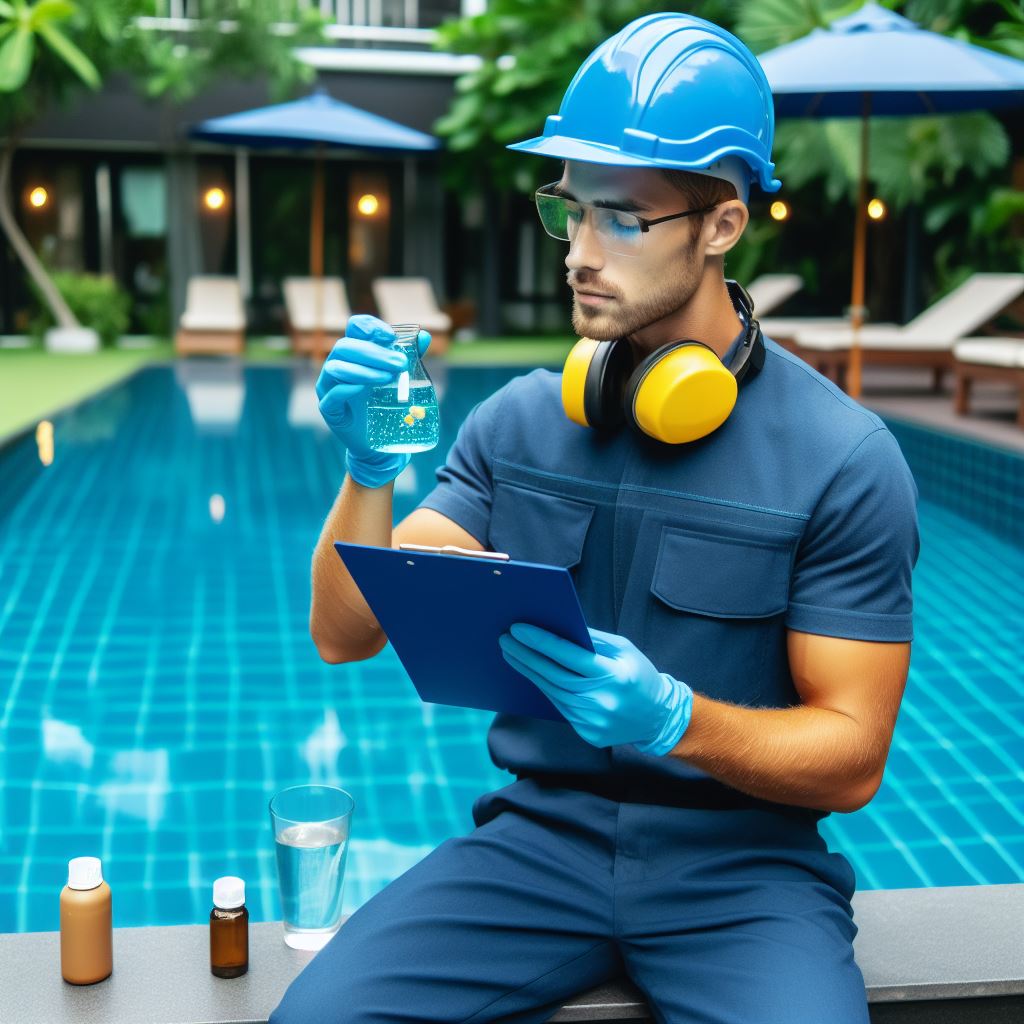Introduction
As the popularity of pool installations continues to rise in the United States, it is crucial to understand the significance of obtaining the necessary permits.
These permits play a vital role in ensuring compliance with regulations and safety standards.
The growing trend of pool installations across the country showcases the increasing desire for recreational water features among homeowners.
However, it is essential to recognize that permits are not mere formalities, but rather an important legal requirement.
Obtaining the required permits is necessary to guarantee compliance with building codes, zoning regulations, and safety guidelines.
These regulations are in place to protect both the pool owners and the surrounding community.
Failure to obtain the necessary permits can have severe consequences.
Homeowners may face hefty fines, penalty fees, and even the forced removal of the pool if it is non-compliant.
Additionally, insurance coverage for accidents or damages may be compromised without proper permits.
In essence, understanding the importance of permits for pools is crucial for anyone considering a pool installation.
It is essential to both comply with regulations and ensure the safety of yourself, your family, and your community.
The next sections will delve deeper into the specific rules and regulations related to pool permits.
Different types of permits for pools
When it comes to building a pool, obtaining the necessary permits is crucial.
There are several types of permits that you should be aware of, each serving an important role in ensuring your pool is safe and up to code.
Building Permits
- A building permit is required for constructing a new pool or making any significant modifications to an existing one.
- These permits ensure that the construction is done safely and in compliance with local building codes.
- You will need to submit detailed plans and specifications to the local building department for approval.
- Inspections will be carried out at various stages of construction to ensure compliance.
It is important to note that building permits are generally not valid indefinitely, and they may have expiration dates.
Make sure to complete the construction within the permitted time frame.
Electrical Permits
- If your pool requires any electrical work, such as wiring for lights, pumps, or heaters, you will need to obtain an electrical permit.
- Only a licensed electrician should undertake any electrical work, as complex pool systems require specialized knowledge.
- An electrical permit ensures that the electrical work is done safely and up to code.
- This includes ensuring proper grounding, wiring, and accordance with local electrical regulations.
Remember, electricity and water can be a dangerous combination. So, it is crucial to hire a qualified professional and obtain the necessary permits.
Plumbing Permits
- If your pool or spa requires new plumbing work or modifications to the existing plumbing system, a plumbing permit is required.
- Plumbing permits are necessary to ensure that the water supply and drainage systems are properly installed and comply with local plumbing codes.
- A licensed plumber should typically handle any plumbing work related to your pool.
- Inspections may be conducted to check for proper installation, backflow prevention, and adherence to regulations.
Obtaining a plumbing permit is vital to prevent potential leaks, contamination, or other plumbing-related issues with your pool.
Why Does Compliance Matter?
Adhering to permit regulations is not just a box to check off – it is essential for safety and legal compliance.
Failure to obtain the required permits or deviating from the regulations can have serious consequences.
Safety
- Building, electrical, and plumbing permits ensure that the pool is constructed and equipped safely, reducing the risk of accidents and injuries.
- Complying with these regulations ensures that proper safety measures, such as fencing and gate requirements, are in place.
Legal Issues
- Building without the necessary permits can result in fines, penalties, and potentially having to undo or modify the construction at your expense.
- Additionally, non-compliance with electrical or plumbing regulations can lead to legal issues and costly repairs down the line.
By obtaining and following the required permits, you can enjoy your pool with peace of mind, knowing that it meets safety standards and is in compliance with the law.
In fact, building permits, electrical permits, and plumbing permits are the main types of permits required for pools.
Adhering to the regulations associated with each permit type is crucial for safety, legal compliance, and avoiding fines or other legal issues.
Remember, always consult with local authorities and professionals to ensure you are meeting all the necessary requirements when building or modifying your pool.
Read: Eco-Friendly Renovations: Top Trends
Obtaining a Building Permit for Pool Construction
Building a pool in your backyard can be an exciting project, but before you dive in, there are some important rules and guidelines you need to know.
One of the crucial steps in this process is obtaining a building permit for pool construction.
Let’s take a closer look at the process, necessary documentation, fees, specific requirements, and additional considerations.
Applying for a Building Permit
When it comes to applying for a building permit for your pool construction, you need to follow a specific process. Here are the steps:
- Visit your local building department or city hall to obtain the necessary application forms.
- Complete the application form, providing all required information, including the dimensions and location of the pool.
- Attach any necessary documentation, such as property surveys, engineering plans, and soil tests.
- Paying the application fee, which generally varies depending on the location and size of the pool.
- Submit the application along with the required documents and fee to the building department.
Specific Requirements for Pool Construction
Pool construction is subject to specific requirements set by local building codes and regulations. Here are some common requirements:
- Setback Distances: Pools must have a certain distance from property lines, buildings, and utilities. Check with your local building department for the specific setback requirements.
- Fencing: Most jurisdictions require pools to be enclosed with a fence for safety purposes. The fence should meet certain height and material requirements to prevent unauthorized access.
- Safety Features: Pools typically need safety features like anti-entrapment drain covers, pool alarms, and compliant pool covers to ensure the well-being of swimmers, especially children.
Additional Considerations
In addition to the general requirements, there may be special conditions or considerations for specific types of pools. Here are two examples:
- Above-Ground Pools: Some jurisdictions have specific regulations for above-ground pools, such as height restrictions, ladder enclosures, and removable stairs.
- Indoor Pools: Building an indoor pool may require additional permits and compliance with ventilation and moisture control standards to prevent mold and humidity issues.
Always consult with your local building department or a professional pool contractor to ensure you meet all the necessary requirements and regulations.
In short, obtaining a building permit for pool construction involves following a specific process, providing necessary documentation, paying fees, and complying with specific requirements.
It’s vital to consider setback distances, fencing, and safety features. Additionally, special conditions may apply to above-ground or indoor pools.
Remember to consult with experts and ensure compliance with local regulations for a smooth pool construction experience.
Read: Roofing Projects: Permitting Essentials
Electrical Permits and Considerations for Pool Installation
When it comes to installing a pool, there are several important factors that need to be considered, especially when it comes to electrical work.
Hiring a licensed electrician should never be overlooked, as it ensures the safety and functionality of your pool.
In this section, we will discuss the importance of hiring a licensed electrician, explain the process of obtaining electrical permits and inspections, and highlight specific electrical requirements for pool installation.
Importance of Hiring a Licensed Electrician
One of the most crucial aspects of installing a pool is ensuring that the electrical work is done correctly.
Hiring a licensed electrician is essential for a number of reasons:
- A licensed electrician has the expertise and knowledge to handle the complexity of pool electrical systems.
- They understand the specific requirements and safety regulations to prevent electrical hazards.
- An electrician will be able to properly install and connect pool equipment, such as lighting, pumps, and heaters.
- They will ensure that all electrical components are grounded and bonded, minimizing the risk of electric shock.
- By hiring a licensed electrician, you can have peace of mind knowing that the work is done correctly and up to code.
Obtaining Electrical Permits and Inspections
Before any electrical work can begin, it is vital to obtain the necessary permits and schedule inspections. Here is the general process:
- Contact your local building department to inquire about the specific permits required for pool electrical work.
- Submit the required documents, which typically include detailed electrical plans and specifications.
- Pay the necessary fees associated with the permit application.
- Once the permit is obtained, you can proceed with the electrical installation according to the approved plans.
- Schedule inspections at various stages of the installation process, such as before and after equipment is connected.
- Ensure that the electrician is present during inspections to address any concerns or modifications required by the inspector.
- Once the final inspection is approved, you will receive a certificate of compliance, indicating that the electrical work meets all safety standards.
Specific Electrical Requirements for Pool Installation
There are several electrical requirements that must be met during the installation of a pool. These include:
- Grounding: All electrical components, including metal parts and equipment, must be properly grounded to prevent electric shock.
- Bonding: Bonding involves connecting all conductive materials together to eliminate potential differences in voltage, reducing the risk of electric shock.
- Ground Fault Circuit Interrupters (GFCI): GFCIs are essential for pool safety. They quickly detect any imbalance in electrical currents and shut off the power to prevent electric shock.
- Proper wiring and connections: The wiring for pool equipment must be installed correctly, ensuring that it can handle the electrical load and is protected from potential damage.
- Outdoor-rated and waterproof fixtures: To prevent electrical hazards, all lighting and other electrical fixtures installed in the pool area must be specifically designed for outdoor use.
It is important to consult with a licensed electrician who is well-versed in pool electrical requirements to ensure compliance with local regulations and national electrical codes.
In general, electrical work is a critical aspect of pool installation.
Hiring a licensed electrician, obtaining the necessary permits and inspections, and adhering to specific electrical requirements are vital for the safety and functionality of your pool.
By following these guidelines, you can enjoy a properly installed and functioning pool while minimizing the risk of electrical hazards.
Read: Hidden Costs in Historic Home Renovations

Plumbing Permits and Regulations for Pool Plumbing
When it comes to constructing a pool, there are several plumbing permits and regulations that need to be followed to ensure compliance and safety.
Here are some important things to know:
General Plumbing Requirements for Pool Construction
- Adequate Sizing: The plumbing system for a pool must be properly sized to handle the water flow and pressure.
- Pipe Materials: High-quality materials, such as PVC or CPVC, should be used for the plumbing system to ensure durability and longevity.
- Proper Ventilation: Adequate ventilation is essential to prevent the buildup of harmful gases, such as chlorine and other chemicals used in pools.
- Accessibility: Plumbing lines and valves must be easily accessible for maintenance and repairs.
- Grounding: Electrical grounding is important for safety, and it should be considered while planning the pool’s plumbing system.
Obtaining a Plumbing Permit and Associated Inspections
- Contact Local Authorities: Start by contacting your local building department to inquire about the specific requirements and permits needed for pool construction.
- Submit Application: Fill out the necessary forms and provide all required information, including detailed plans of the plumbing system.
- Payment of Fees: Pay the required fees for the plumbing permit application. The fee amount varies depending on the location and scope of the project.
- Plan Review: The building department will review the plans submitted and ensure compliance with local plumbing codes and regulations.
- Inspection Schedule: Once the plans are approved, you can schedule the necessary inspections at various stages of the pool construction process.
- Follow-up Inspections: During the construction process, inspections will be conducted to ensure that the plumbing system is installed correctly and meets the required standards.
- Final Inspection: Once the pool construction is completed, a final inspection is carried out to verify compliance with all plumbing regulations.
Important Considerations: Backflow Prevention and Drainage Systems
- Backflow Prevention: It is crucial to install backflow prevention devices to prevent the contamination of the pool water from the plumbing system.
- Air-Gap Systems: Air-gap systems are commonly used for backflow prevention in pool plumbing and must adhere to local regulations.
- Proper Drainage Systems: Pool plumbing must include proper drainage systems to prevent the accumulation of stagnant water and ensure efficient water flow.
- Gravity Drainage: Gravity drainage systems are commonly used, where water is directed to a drain or outfall using gravitational force.
- Sump Pump Installation: In some cases, a sump pump may be required to remove excess water from the pool area or to pump water into drainage systems.
- Stormwater Management: Adequate planning for stormwater management is essential to prevent flooding or damage to the pool and surrounding areas.
In review, obtaining plumbing permits for pool construction involves following specific regulations for sizing, materials, ventilation, and accessibility.
The process includes submitting an application, paying fees, plan reviews, and inspections.
It is also important to consider backflow prevention and proper drainage systems to ensure safety and compliance throughout the construction process.
Adhering to these rules will help you create a safe and functional pool plumbing system.
Read: Balancing Modern Comfort & History
Safety Regulations and Permits for Pool Fencing
Having a pool in your backyard can be a wonderful addition to your home, providing endless hours of fun and entertainment for your family and friends.
However, it is crucial to prioritize safety when it comes to pool ownership. One of the key safety measures is to install a pool fence.
In this article, we will highlight the importance of having a pool fence for safety purposes and discuss specific requirements for pool fences.
Importance of Pool Fencing for Safety Purposes
A pool fence acts as a barrier, preventing unsupervised access to the pool area.
This is especially important if you have young children or pets who may be at risk of accidental drowning.
According to the Centers for Disease Control and Prevention (CDC), drowning is the leading cause of unintentional death among children aged 1-4 years.
By installing a pool fence, you can create a secure environment and reduce the likelihood of such tragic incidents.
It provides peace of mind to parents and caretakers, knowing that their loved ones are protected from potential dangers associated with pool ownership.
Specific Requirements for Pool Fences
To ensure maximum safety, pool fences must meet specific requirements. These include the following:
- Height: The fence should be at least 4 feet high, with no gaps or footholds that could allow children or pets to climb over.
- Gate Latching Mechanisms: The gate of the pool fence should have a self-closing and self-latching mechanism, ensuring that it remains closed and locked at all times.
- Distance from the Pool: The fence should be installed at a reasonable distance from the pool to prevent direct access. This distance requirement may vary depending on local regulations, so it’s important to check the specific requirements in your area.
These requirements are in place to ensure that the pool fence effectively serves its purpose and provides the necessary safety precautions.
Process of Obtaining Permits for Pool Fences
Before installing a pool fence, it is important to understand the process of obtaining the necessary permits.
The specific requirements and regulations vary depending on your location, so it is essential to check with your local authorities.
Typically, the process involves the following steps:
- Research: Gather information about the permits required for pool fences in your area. Visit the official website of your local government or contact the relevant department to understand the specific regulations.
- Submit Application: Complete the application form for the pool fence permit. This may require providing details about the fence’s height, materials, and location.
- Pay Fees: Some jurisdictions charge a fee for pool fence permits. Make sure to budget for this expense.
- Inspection: Once the permit is obtained, the local authorities may conduct an inspection to ensure that the pool fence meets the required standards.
Potential Consequences of Non-Compliance
Non-compliance with pool fence regulations can have serious consequences.
Depending on your local laws, the consequences may include fines, penalties, or even legal action.
Moreover, in the event of an accident or drowning in a pool that does not meet the required safety standards, you may face liability issues.
To prevent these potential consequences and prioritize the safety of your loved ones, it is crucial to comply with pool fence regulations and obtain the necessary permits before installing a pool fence.
In a nutshell, when it comes to pool ownership, safety should always be a top priority.
Installing a pool fence that meets the specific requirements, obtaining the necessary permits, and complying with local regulations will provide a secure environment for your family and give you peace of mind.
Other permits and considerations
When it comes to building a pool, there are several permits and regulations that may apply to specific states or regions.
It’s important to be aware of these requirements and ensure compliance before starting construction.
Here are some key considerations and resources to help you navigate through the permit process effectively:
Additional Permits and Regulations
Aside from the general pool construction permits, there may be additional permits or regulations based on your specific location.
These can include permits for excavation, electrical work, plumbing, or even additional safety requirements.
Make sure to research and identify all necessary permits applicable to your area.
Importance of Local Regulations
Checking and adhering to local regulations and codes is of utmost importance when building a pool.
Each city or county may have its own set of rules regarding pool construction, safety barriers, fencing, water disposal, and more. Ignoring or overlooking these regulations can lead to fines, delays, or even legal repercussions.
Research and Planning
Before starting any construction, dedicate some time to research and understand the local regulations and codes.
Contact the local building department or zoning office to obtain the necessary information.
Some areas might have specific setbacks, size limitations, or safety requirements that you need to adhere to.
Being well-informed from the beginning will save you both time and frustration.
Permit Application Process
Familiarize yourself with the permit application process.
Determine the required documents, fees, and any inspections that need to be scheduled throughout the construction process.
Stay organized and keep all records handy to ensure a smooth application and approval process.
Seek Professional Help
Consider consulting with a pool contractor or builder who is familiar with local regulations and permit requirements.
They can guide you through the process, assist with permit applications, and ensure that your pool meets all necessary safety standards.
Government Websites
Government websites can be an excellent resource for obtaining more information on permits and regulations.
They provide detailed guidelines specific to your region and may even offer permit application forms online.
Bookmark these websites for easy access and refer to them throughout the pool construction process.
Additional Resources
Apart from government websites, there are other resources available that can help you understand the permit requirements.
Local pool associations, industry-specific forums, or community groups can provide valuable insights and experiences related to obtaining permits for pool construction.
Engage with these communities to learn from their experiences and gain practical knowledge.
Remember, obtaining the necessary permits and adhering to local regulations is crucial not only to comply with the law but also to ensure the safety of those who will use the pool.
Failure to meet these requirements can lead to accidents, penalties, or delays in completing your project.
Invest time in understanding the permit process, collaborate with professionals, and be proactive in seeking information to make your pool construction a hassle-free experience.
Common Mistakes to Avoid When Dealing with Permits for Pools
Obtaining the necessary permits for building a pool can be an exciting but daunting task for homeowners.
To ensure a smooth permit acquisition process, it is crucial to avoid common mistakes and errors that can lead to costly delays or penalties.
In this blog section, we will identify these common mistakes and provide tips and guidance on how to avoid them.
Lack of Research and Planning
One of the biggest mistakes homeowners make is failing to research and plan adequately before applying for permits.
It is crucial to familiarize yourself with local regulations, zoning requirements, and permit fees to avoid surprises later on.
Incorrect Pool Dimensions or Location
Providing accurate pool dimensions and choosing the right location is crucial when submitting permit applications.
Any discrepancies or changes in dimensions can lead to delays or rejections. Ensure that your plans are precise and meet all requirements.
Incomplete Permit Applications
Submitting incomplete permit applications is another common error. Double-check all the required documents, forms, and drawings before submitting.
Incomplete applications can lead to unnecessary delays in permit acquisition.
Failure to Hire a Licensed Contractor
Hiring an unlicensed or inexperienced contractor is a grave mistake.
Make sure to hire a licensed professional with pool construction experience to ensure that the project meets all safety standards and building codes.
Lack of Communication with Authorities
Homeowners often fail to communicate with local authorities or building departments during the permit acquisition process.
Building rapport with officials can help clarify any doubts, address concerns, and smoothen the approval process.
Ignoring HOA or Neighborhood Requirements
Many neighborhoods and homeowner associations (HOAs) have their own set of regulations regarding pool construction.
Neglecting these requirements can lead to complications and delays. Always ensure that your plans comply with both local and neighborhood regulations.
Violating Construction Codes
Failure to comply with construction codes is a serious offense that can result in penalties or even having to redo the entire construction.
Ensure hiring experts who know local building codes well and adhere to them rigorously.
Disregarding Safety Measures
Safety should be a top priority when building a pool. Neglecting safety measures, such as proper fencing and signage, can lead to accidents and legal issues.
Ensure that your pool design includes all necessary safety elements to protect both residents and visitors.
Avoiding these common mistakes is crucial to ensure a smooth permit acquisition process and avoid any costly delays or penalties.
Always conduct thorough research, consult with professionals, and communicate effectively with authorities.
By doing so, you will be able to enjoy your new pool without any unnecessary stress or complications.
Conclusion
Understanding and adhering to permit requirements for pool construction is crucial. Summarizing the key points:
- Obtaining permits for pool construction is necessary to ensure compliance with local regulations and safety standards.
- Permit requirements may vary depending on location, including setbacks, fencing, and electrical codes.
- Failing to obtain permits can result in legal issues, fines, and the requirement to remove the pool.
- Permits also provide an opportunity for inspections to ensure the pool is built correctly and meets safety standards.
- Prioritizing permits and compliance is essential for a safe and enjoyable pool experience.
By following permit rules, homeowners can prevent potential accidents, injuries, and costly legal problems.
It is not worth risking the dangers of non-compliance. Ensure your pool meets all regulations to guarantee safety and peace of mind.
Never underestimate the responsibilities and importance of securing and adhering to permit requirements. Take action to ensure compliance.
Take the necessary steps and enjoy your pool without worrying about potential legal issues or risks to yourself and others.
Prioritize permits for pools to make your swimming experience truly worry-free. Dive into a safe and enjoyable pool season!




